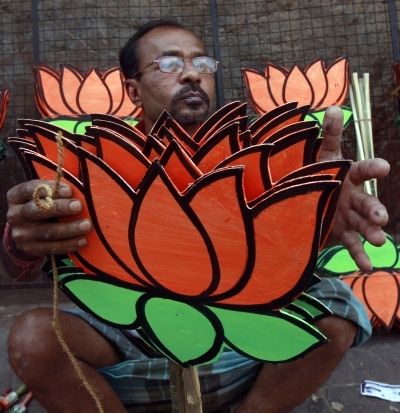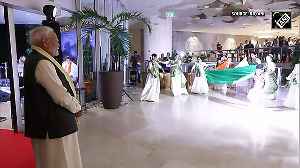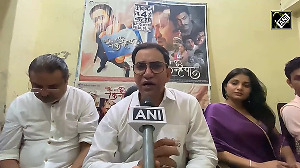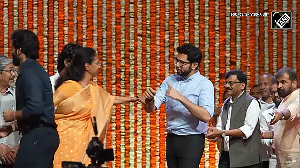 'The BJP suddenly seems vulnerable. This is not entirely surprising. In the past too, governments and leaders who won a thumping Lok Sabha majority lost popularity in a matter of months... The by-polls results shows that a degree of disenchantment with the Modi government is setting in,' says Praful Bidwai.
'The BJP suddenly seems vulnerable. This is not entirely surprising. In the past too, governments and leaders who won a thumping Lok Sabha majority lost popularity in a matter of months... The by-polls results shows that a degree of disenchantment with the Modi government is setting in,' says Praful Bidwai.
Within weeks of winning the Lok Sabha elections with a surprisingly large margin, the Bharatiya Janata Party-led National Democratic Alliance has suffered major setbacks in the assembly by-elections in four states.
Of the 18 seats for which elections were held -- 10 seats in Bihar, three each in Madhya Pradesh and Karnataka, and two in Punjab -- the NDA won only 8, down from its victory in 14 Assembly segments earlier. A majority, 10 seats, went to the Congress and its allies.
The fact that the first three states were among the top six big states in which the NDA scored convincing or crushing Lok Sabha victories means that the electorate's mood has changed, especially in northern India, the BJP's main base.
The party's Acchhey Din promise hasn't translated into more jobs, stable prices, improved social conditions, or better governance. A degree of disenchantment with the Modi government is setting in.
Second, Mr Modi was a huge, indeed overwhelming, factor in the national elections, and absolutely indispensable to the BJP-NDA's victory. But he did not and cannot play a pivotal role in state assembly elections, and give the BJP a leg-up.
Third, the results show that if the right coalition of parties is built -- like the 'grand alliance' in Bihar, including long-time rivals the Janata Dal-United and the Rashtriya Janata Dal, along with the Congress -- the BJP can be defeated.
In Uttarakhand too, in assembly by-elections held just a month ago, the Congress won an emphatic victory in all three seats under Chief Minister Harish Rawat's popular leadership: In one seat (Doiwala), a local Congressman even defeated a high-ranking BJP functionary.
The Congress also won more than 70 percent of seats in the recent panchayat elections. The BJP had swept all 5 Lok Sabha seats in Uttarakhand in May. But it soon got worsted in straight bipolar contests.
The BJP suddenly seems vulnerable. This is not entirely surprising. In the past too, governments and leaders who won a thumping Lok Sabha majority lost popularity in a matter of months, the clearest case being that of Rajiv Gandhi who had won the 1984 election with a record 400-plus Lok Sabha seats and the Congress's highest-ever national vote-share. Popular disillusionment with him had set in by mid-1985, much before the Bofors scandal broke out in 1987.
The difference this time is that people seem to be moving away within weeks from a party which only won 31 percent of the national vote, has a shallow base, and whose appeal was artificially manufactured through Mr Modi's larger-than-life image and an aggressive campaign supercharged with corporate funding running into tens of thousands of crores of rupees.
It would be premature to read into the by-election results as a rejection of Mr Modi's communal politics, as Congress General Secretary Digvijay Singh has done. But there is no ambiguity whatsoever about the signals emanating from the all-important outcome in Bihar.
There, the combined tally of the BJP and Ram Vilas Paswan's Lok Janashakti Party fell to just 6 seats from the 9 assembly-segment leads it established in the Lok Sabha elections. It saw an 8 percentage-point drop in its vote. The JD-U-RJD-Congress alliance gained almost 5 percentage-points in votes to win 6 of 10 seats.
According to Patna-based political analyst Shaibal Gupta, the alliance could have won two more seats, Banka and Hajipur, where the BJP won with paper-thin margins. But contingent factors (heavy rains in one case, and communal counter-polarisation against Muslims in the other) came to the BJP's rescue.
Even more important, voters and party workers weren't quite sure that the JD-U and the RJD, which parted ways 17 years ago to become bitter adversaries, would stick together.
But now that voters have seen that the JD-U-RJD-Congress 'grand alliance' is actually working, and has a 7.6 percentage-point lead over the BJP, the outcome of the assembly elections next year could well go against the BJP-LJP -- unless they whip up a communal frenzy.
A defeat in Bihar would be a major setback to the NDA which had won 31 of its 40 Lok Sabha seats. This will have national-level implications, not least because of Bihar is India's third most populous state, but also because the 'grand alliance' strategy exposes the BJP's vulnerability.
The results from Karnataka and Madhya Pradesh are also a shot in the arm for the Congress. In Karnataka, it not only retained Chikkodi, but snatched from the BJP Bellary Rural, a stronghold of the Reddy Brothers notorious for their shady iron-ore mining operations. This re-established Chief Minister Siddaramaiah's clout.
In MP, the Congress, which suffered a comprehensive 2:27 rout in the Lok Sabha, wrested Bahoriband from the BJP, stunning it.
There are lessons in the results for the Congress and other non-NDA parties. The Congress must give up the illusion that it is the 'natural' leader of future alliances. Having been reduced to just 44 Lok Sabha seats, its lowest-ever score, it has no choice but to make alliances and coalitions, with humility and deference towards other parties, however small.
The Congress must build itself up slowly and painstakingly, just as it did in the 1990s, without pretending that the Gandhi family can deliver a shortcut to power. The family, in particular Rahul Gandhi, has failed. The Congress will have to reconnect with the urban poor and subaltern classes like the Dalits and most backward among the OBCs, which are weakly represented in most parties. To do this, the Congress must develop a new expansive programmatic agenda.
As for the JD-U, it played its cards well by getting Nitish Kumar to resign as Bihar chief minister and invest his energies in building the 'grand alliance'. But JD-U President Sharad Yadav may nurture an illusion in planning to reunite the old 'Janata Parivar' nationally on a slogan of 'Total Justice', which evokes the symbolism of Jayaprakash Narayan's 'Total Revolution.'
The 'Janata Parivar' has splintered irrevocably among rival parties and the politics of Mandal-style 'social justice' seems to be running out of steam because of its preoccupation with identity and recognition.
Subaltern politics must move towards substantive social transformation based on a radical agenda of redistribution of assets and income, and empowerment of the poor through entitlement to jobs, education, healthcare and social services.
As for the other two great losers of the Lok Sabha election, Mayawati's Bahujan Samaj Party, and the Left, there is no easy way out of their present crisis. The BSP's 'sarvajan' tactic of building a coalition between its Dalit base and upper-caste Hindus, which brought it to power in UP in 2007, is no longer working. To expand its base, it must think anew and adopt a more radical perspective.
The Left cannot find an electoral solution to its present beleaguerment. In fact, it is precisely because of its excessive parliamentarism, preoccupation with state power, and a weakening of its links with mass organisations in recent years, especially in West Bengal, that it finds itself in a mess. It has to go back to mass struggles on issues of concern to the underprivileged, including defence of livelihoods, and rights to healthcare, education, gender justice and environmental protection.
In Kerala, the Left must abandon its opposition to the Western Ghats conservation plan proposed by the Gadgil commission. Its opposition was based on short-term electoral calculations which ultimately didn't pay off -- just as Singur and Nandigram didn't in West Bengal: Indeed, they aggravated the Left's crisis of credibility and precipitated its decline after 2008.
The Left must not fall into the trap of following a policy based on the 'twin-danger' thesis that some of its leaders advocate, which equates the Congress with the BJP and targets the BJP primarily because it is in power while totally opposing the Congress. A limited tactical understanding with the Congress may be in order to resist the BJP's communalism and the strong-arm tactics used by West Bengal's ruling Trinamool Congress against the Left and the Congress.
Faced with Trinamool attacks, hundreds of CPI-M cadres are defecting to the BJP. Nothing could be more unfortunate. And nothing could more effectively impede the Left's return to mass mobilisation both independently, and in alliance with progressive civil society groups.
To return to national politics, a great deal will depend on what happens in the three Lok Sabha and 33 assembly by-elections due in mid-September in 11 states. Crucial here are the 11 assembly elections in UP. These won't be four-way contests in which the BJP has an advantage -- because Mayawati has decided not to fight them.
If, as reported, she supports the Congress and transfers her 20-percent Dalit vote to it, the overall result may not strongly favour the BJP.
Whatever happens, the BJP's victory in the Lok Sabha election, despite its magnitude, is unlikely to prove a landmark in imparting stability to Indian politics. Recent developments suggest that India will witness intense political competition and turmoil in the near future.




.jpg)






